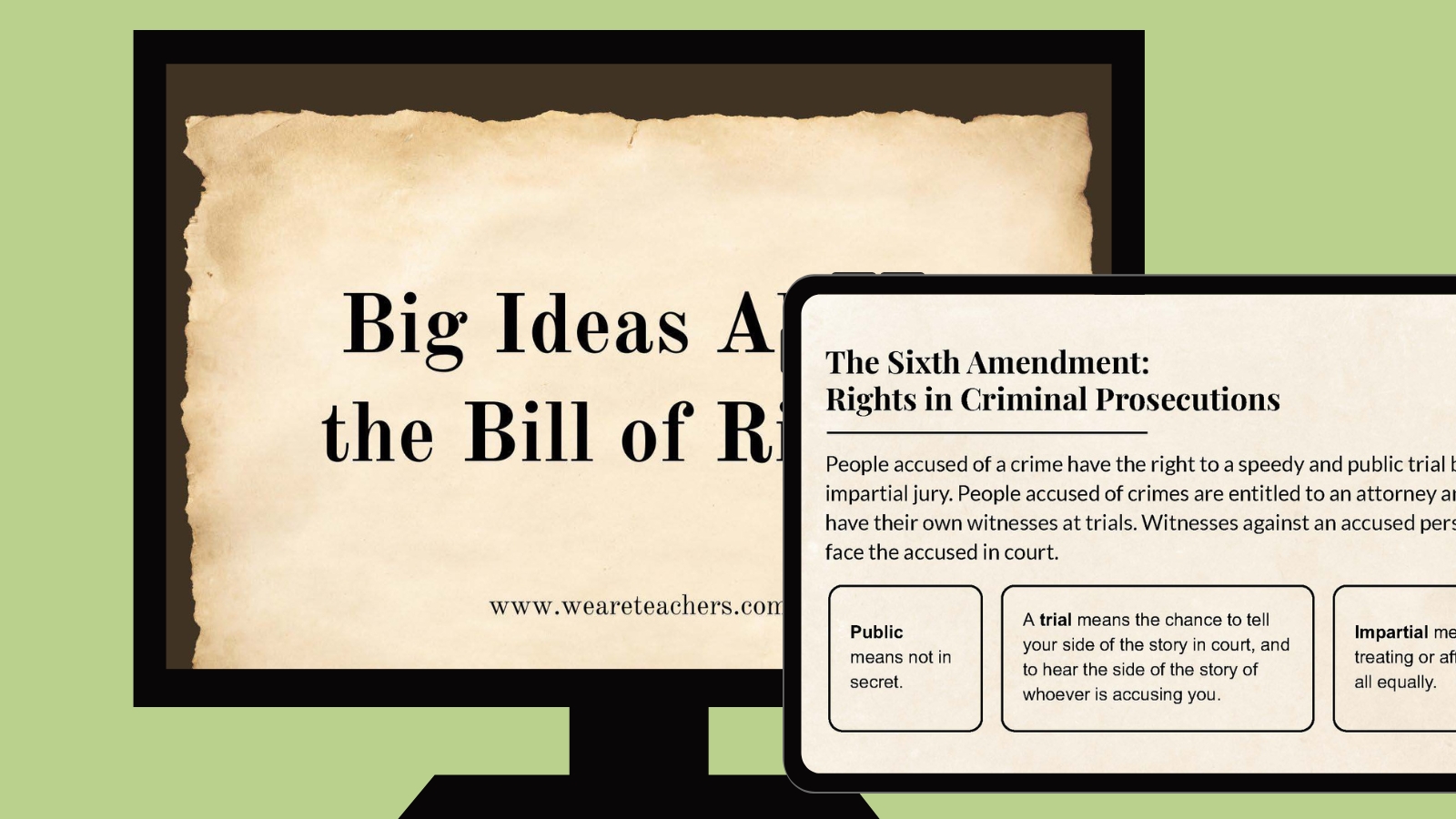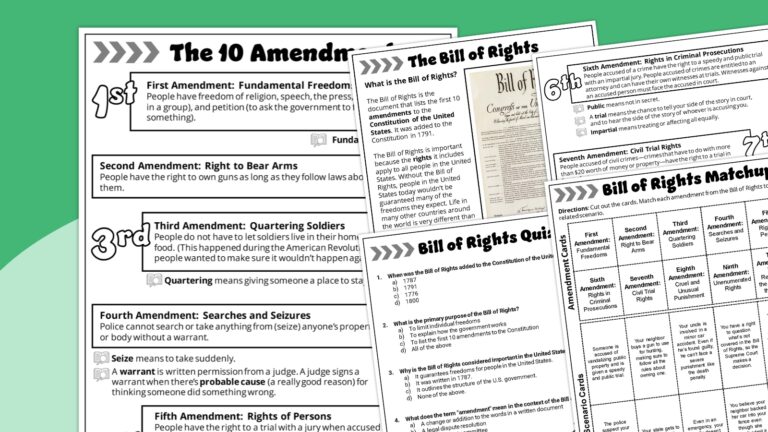Teaching kids about the Bill of Rights is crucial for helping them build background knowledge about the United States government and legal system. Whether you’re gearing up to celebrate Bill of Rights Day on December 15 or planning a social studies unit, we’ve done the work for you and pulled together a fantastic collection of Bill of Rights resources for kids.
Don’t miss our free downloadable. Grab your full set of ready-to-go Bill of Rights for Kids Google Slides with kid-friendly explanations and discussion questions for your classroom.
Jump to:
- Bill of Rights Explanation for Kids
- List of the First 10 Amendments
- Bill of Right Discussion Questions
- Bill of Rights Worksheet, Activity Ideas, and Lesson Plans
- Kids Books About the Bill of Rights
- Kids Videos and Songs About the Bill of Rights
- More Bill of Rights Classroom Resources
Bill of Rights Explanation for Kids
What is the Bill of Rights?
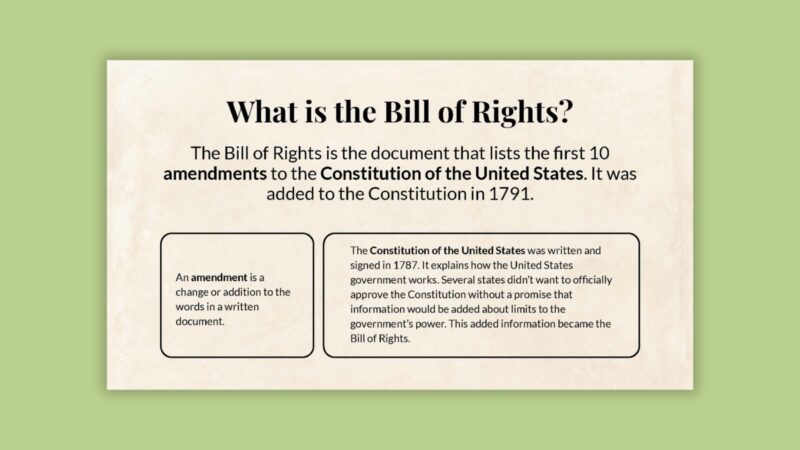
The amendments in the Bill of Rights added important information to the U.S. Constitution about the rights of individual people in the United States.
Why is the Bill of Rights important?
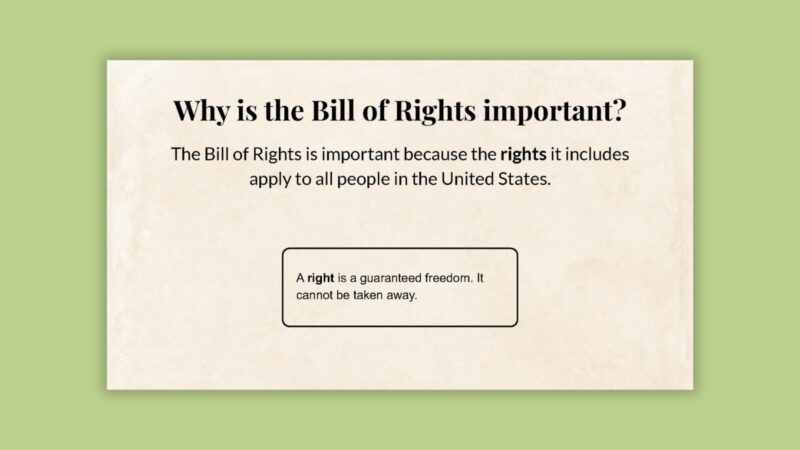
More than 200 years after it was written, the Bill of Rights still protects every person in the United States today.
How does the Bill of Rights affect our lives today?
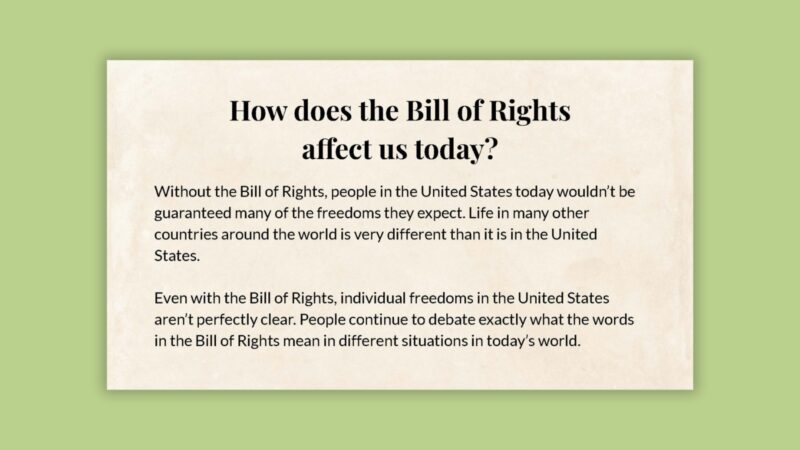
The Bill of Rights protects our freedoms and has helped make the United States the country it is today as compared to other countries around the world.
What are the first 10 amendments to the U.S. Constitution?
When translating the Bill of Rights for kids, you’ll want to share some of the formal language along with simplified explanations. Download our Google Slides to make a class introduction or note-taking lesson easy! For more background on the language in each amendment, check out the Library of Congress’ Constitution Annotated page.
The First Amendment: Fundamental Freedoms
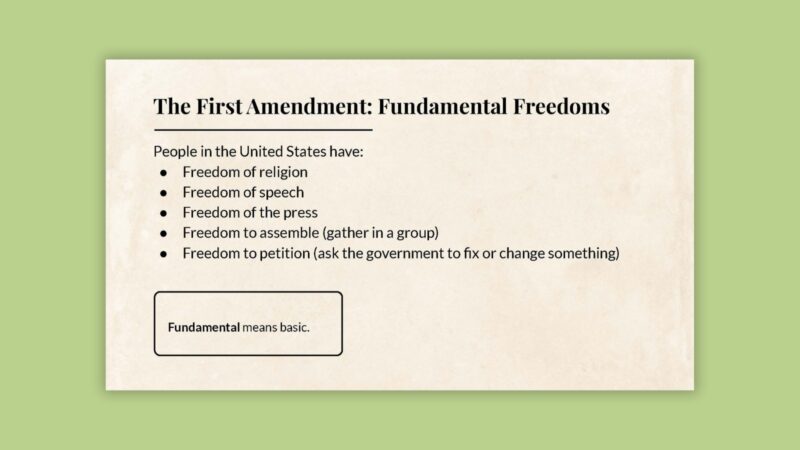
People in the United States have:
- Freedom of religion
- Freedom of speech
- Freedom of the press
- Freedom to assemble (gather in a group)
- Freedom to petition (ask the government to fix or change something)
The Second Amendment: The Right to Bear Arms
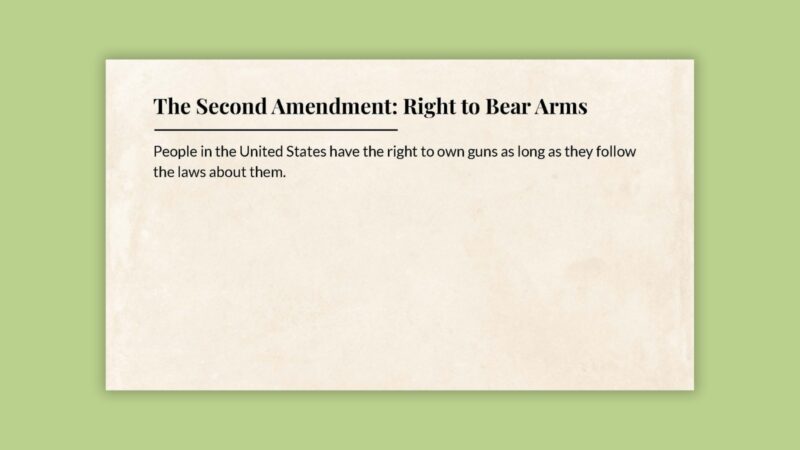
People in the United States have the right to own guns as long as they follow the laws about them.
The Third Amendment: Quartering Soldiers
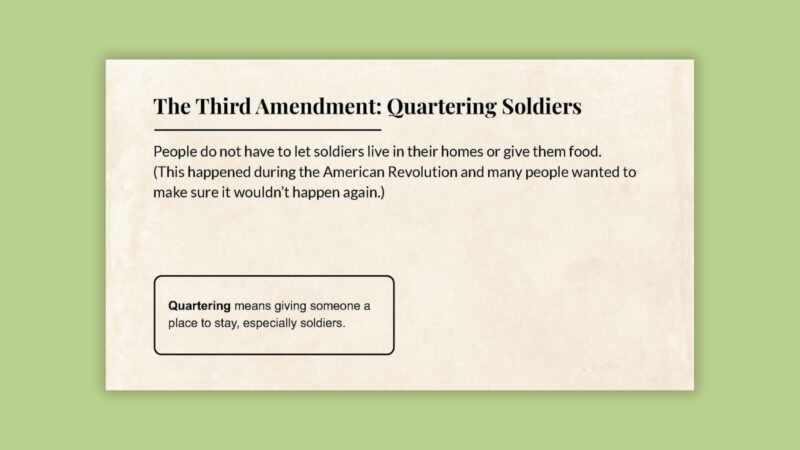
People do not have to let soldiers live in their homes or give them food. (This happened during the American Revolution and many people wanted to make sure it wouldn’t happen again.)
The Fourth Amendment: Searches and Seizures
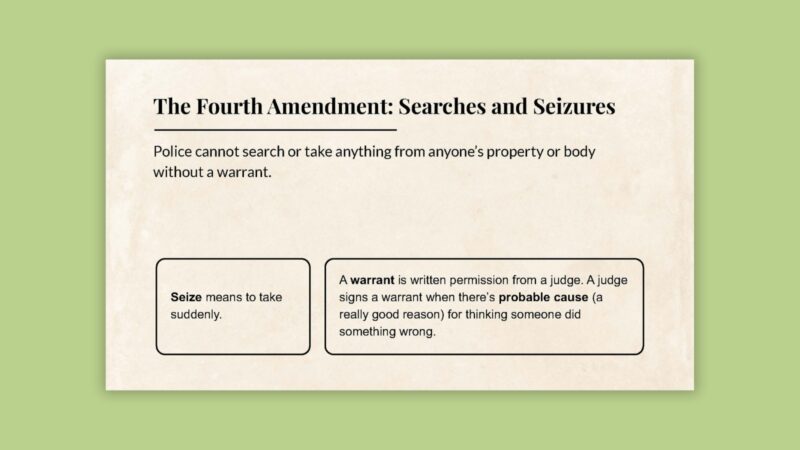
Police cannot search or take anything from anyone’s property or body without a warrant.
The Fifth Amendment: Rights of Persons
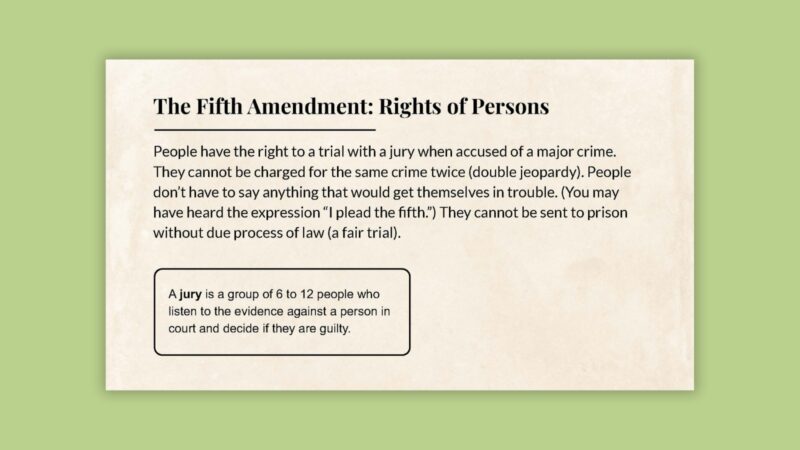
People have the right to a trial with a jury when accused of a major crime. They cannot be charged for the same crime twice (double jeopardy). People don’t have to say anything that would get themselves in trouble. (You may have heard the expression “I plead the fifth.”) They cannot be sent to prison without due process of law (a fair trial).
The Sixth Amendment: Rights in Criminal Prosecutions
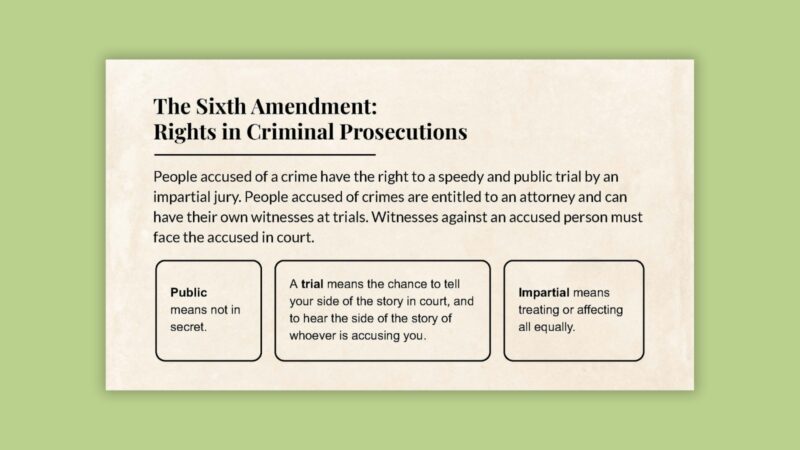
People accused of a crime have the right to a speedy and pubic trial by an impartial jury. People accused of crimes are entitled to an attorney and can have their own witnesses at trials. Witnesses against an accused person must face the accused in court.
The Seventh Amendment: Civil Trial Rights
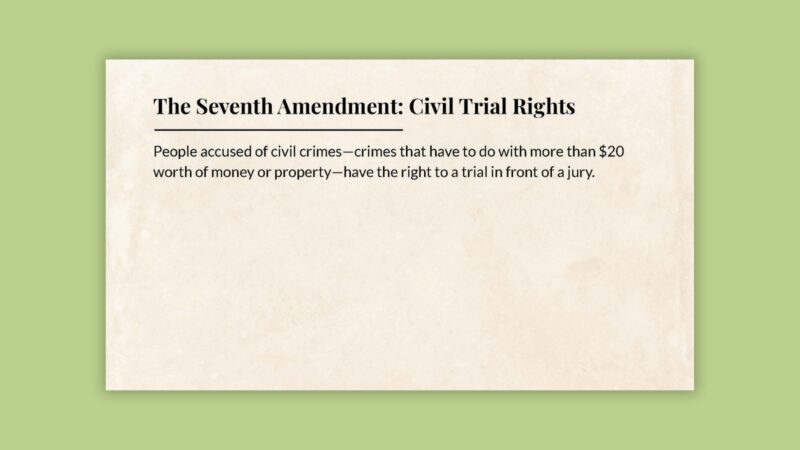
People accused of civil crimes (crimes that have to do with more than $20 worth of money or property) have the right to a trial in front of a jury.
The Eighth Amendment: Cruel and Unusual Punishment
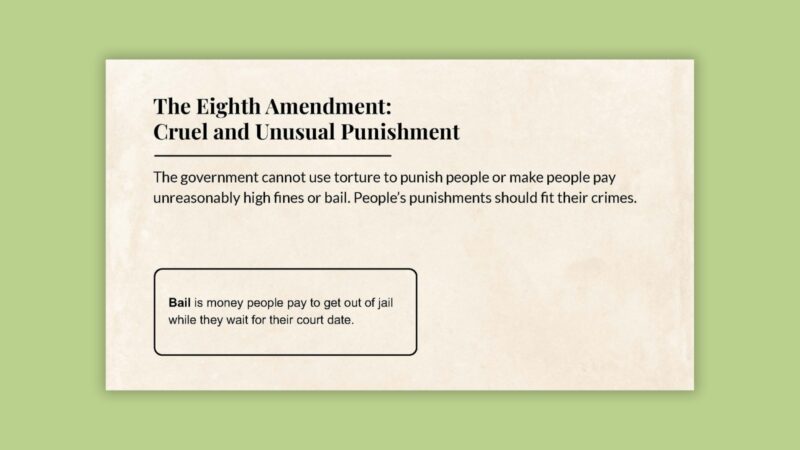
The government cannot use torture to punish people or make people pay unreasonable high fines or bail. People’s punishments should fit their crimes.
The Ninth Amendment: Unenumerated Rights
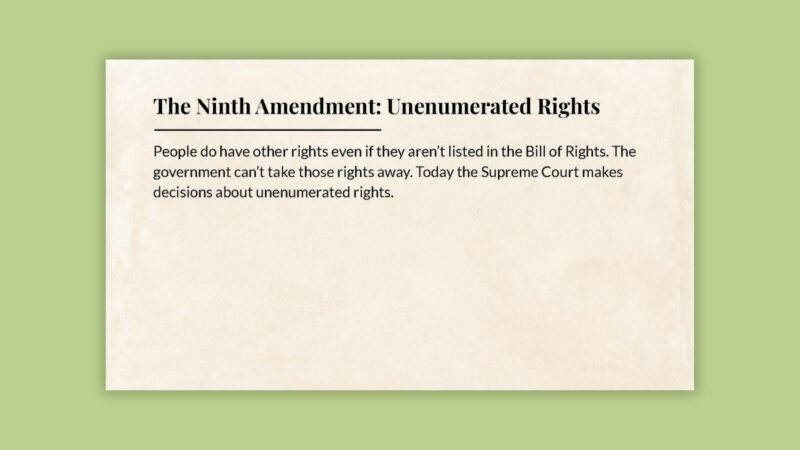
People do have other rights even if they aren’t listed in the Bill of Rights. The government can’t take those away. Today the Supreme Court makes decisions about unenumerated rights.
The Tenth Amendment: Rights Reserved to the States and the People
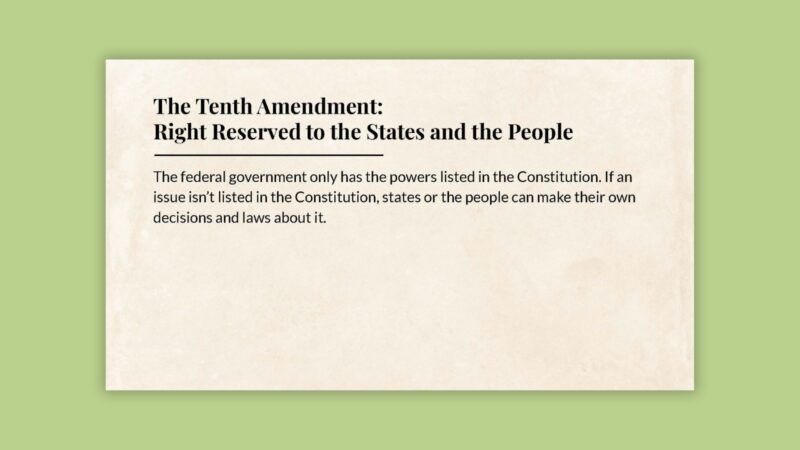
The federal government only has the powers listed in the Constitution. If an issue isn’t listed in the Constitution, states or people can make their own decisions and laws about it.
Discussion Questions for Kids About the Bill of Rights
Help kids understand the Bill of Rights by getting them to think about how it relates to their lives.
Rights for Kids
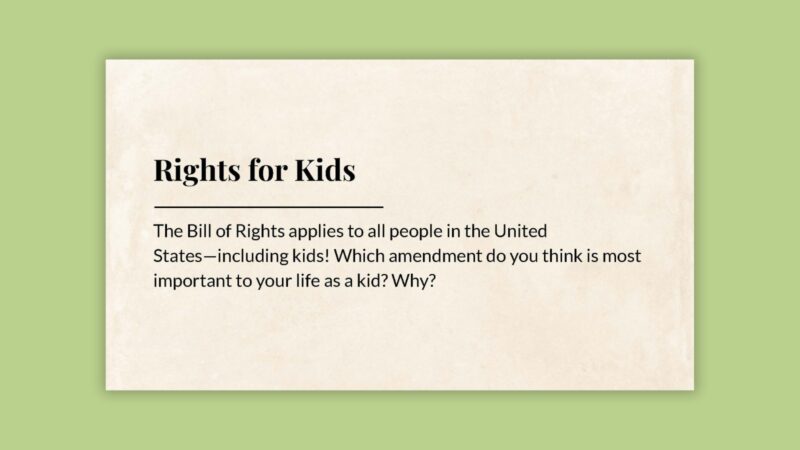
The Bill of Rights applies to all people in the United States—including kids! Which amendment do you think is most important to your life as a kid? Why?
Rights vs. Privileges
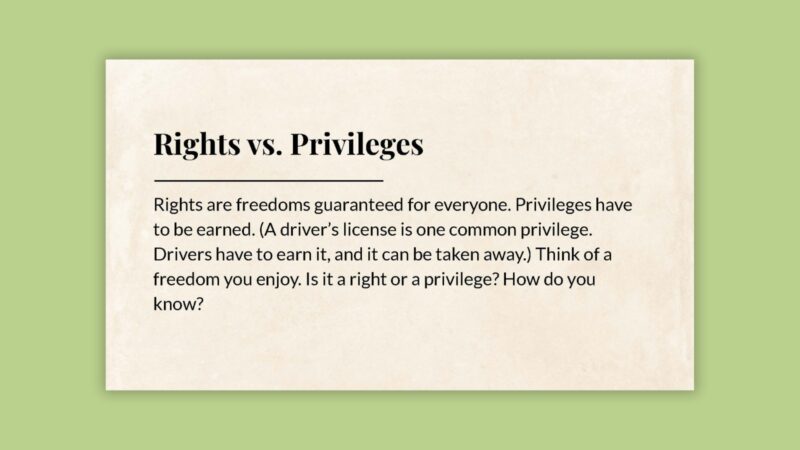
Rights are freedoms guaranteed for everyone. Privileges have to be earned. (A driver’s license is one common privilege. Drivers have to earn it, and it can be taken away.) Think of a freedom you enjoy. Is it a right or a privilege? How do you know?
Amendment, Please!
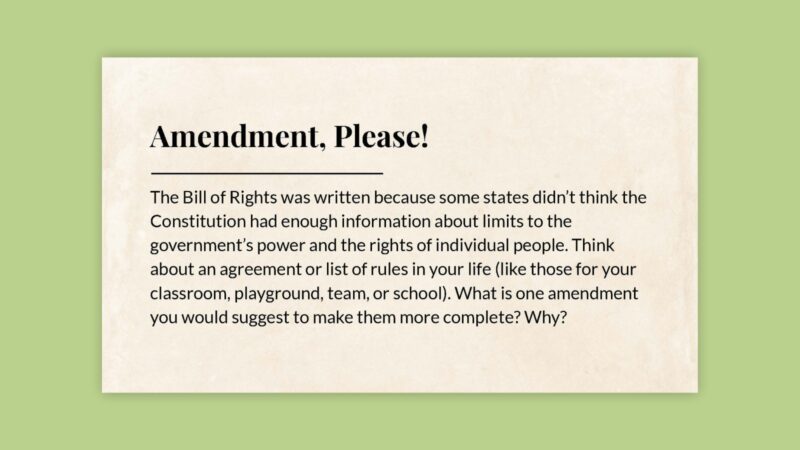
The Bill of Rights was written because some states didn’t think the Constitution had enough information about limits to the government’s power and rights of individual people. Think about an agreement or list of rules in your life (like for your classroom, playground, team, or school). What is one amendment you would suggest to make it more complete? Why?
Bill of Rights Worksheets, Activities, and Lesson Plans
Check out our free Bill of Rights worksheets plus other favorite teacher-tested activities and lesson plans to make teaching the Bill of Rights easier.
Activity: Bill of Rights Matching Cards
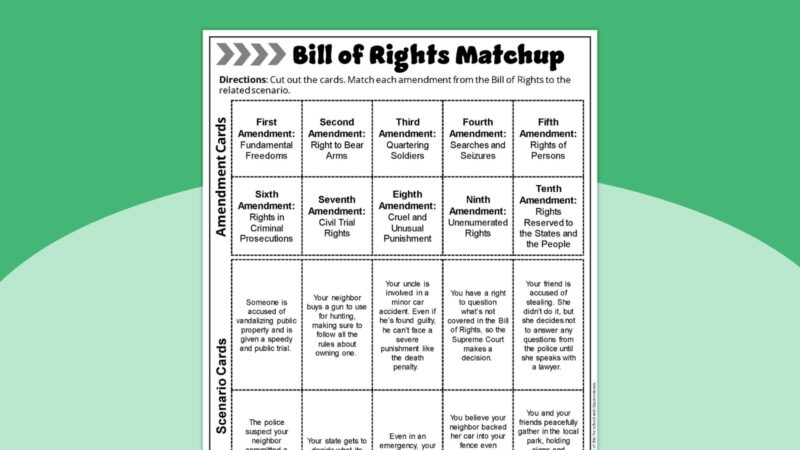
Use these matching cards as a Bill of Rights worksheet task by asking students to cut and glue them in pairs on a blank page or in their notebooks. Hide them around the classroom and have students work together to find and match them in a pocket chart. Or have students read or act out each scenario card and have their peers guess which amendment relates to their scene. Students can also write their own examples of other situations that apply to each amendment.
Try it: Bill of Rights Matching Cards at We Are Teachers
Activity: Bill of Rights Choice Board
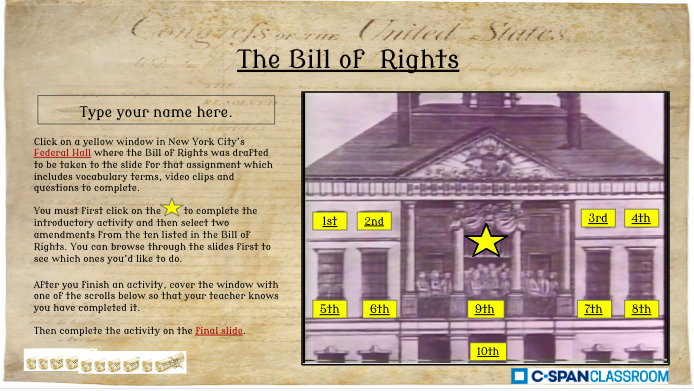
C-Span Classroom offers a downloadable Google Slides choice board that features drag-and-drop vocabulary activities for each amendment along with lots of video clips. This is a great one-stop resource for upper middle school and high school students to explore each amendment in detail.
Try it: Bill of Rights Choice Board at C-Span Classroom
Activity: Bill of Rights Bingo
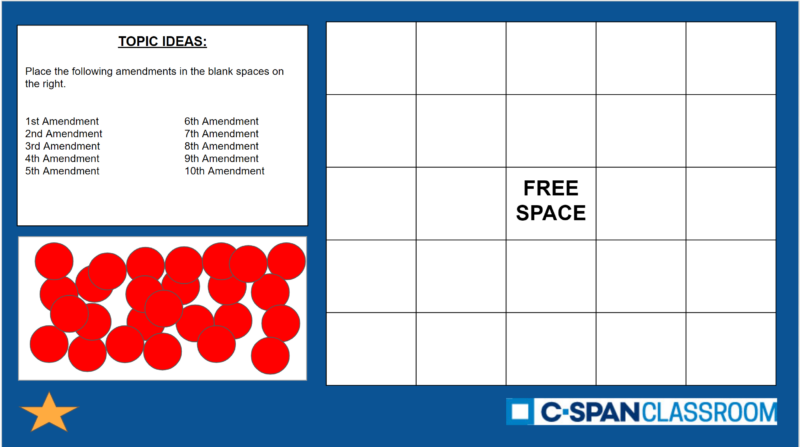
An extension activity from C-Span Classroom, this digital bingo board helps students test their knowledge of each amendment.
Try it: Bill of Rights Bingo at C-Span Classroom
Activity: Bill of Rights Worksheet and Student Handouts
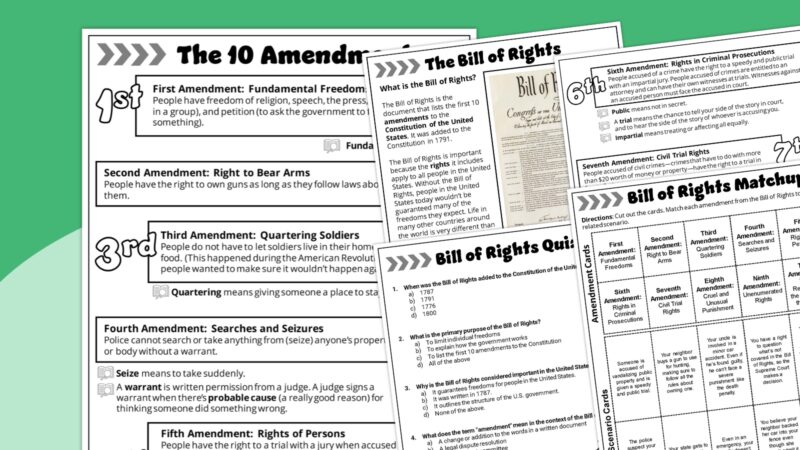
This Bill of Rights worksheet bundle includes printable student handouts with information about the Bill of Rights and the 10 amendments along with a reading comprehension quiz.
Try it: Bill of Rights Student Handouts and Worksheet at We Are Teachers
Lesson Plan: The First Amendment & Free Speech
This elementary school lesson plan from the American Constitution Society for Law and Policy gets classrooms talking about nuances of free speech with discussion prompts based on pictures.
Get it: The First Amendment & Free Speech lesson plan at American Constitution Society for Law and Policy
Lesson Plans: Bill of Rights
These multi-day lesson plans from the National Constitution Center include background information, discussion topics, and games to teach students all about the Bill of Rights. They offer versions for grades 3-5 and grades 6-8.
Get it: Bill of Rights lesson plans at National Constitution Center
Lesson Plan: Congress and the Bill of Rights in History and Today
This in-depth lesson plan from the National Archives gets high school students talking about their rights, studying primary sources, and engaging in debates.
Get it: Congress and the Bill of Rights in History and Today lesson plan at National Archives
Kids Books About the Bill of Rights
A solid book collection is always helpful. These are our favorite Bill of Rights books for kids.
Free for You and Me: What Our First Amendment Means by Christy Mihaly
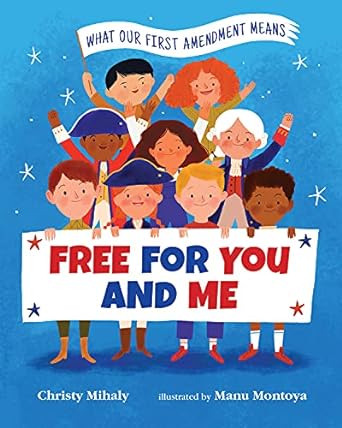
There’s so much to talk about just in the First Amendment in the Bill of Rights. This picture book is perfect for helping elementary kids break it down. For upper elementary and middle school kids, extend the book’s concepts with Curious City’s free educator guide.
Buy it: Free for You and Me: What Our First Amendment Means at Amazon
The Bill of Rights in Translation: What It Really Means by Amie Jane Leavitt
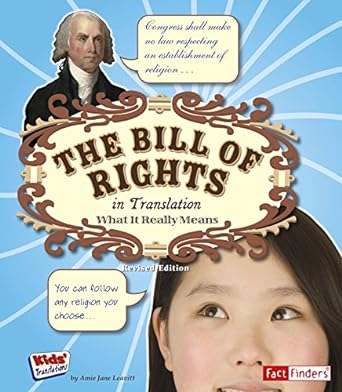
This is our favorite read-aloud to introduce all things Bill of Rights to elementary kids.
Buy it: The Bill of Rights in Translation: What It Really Means at Amazon
A Kids’ Guide to America’s Bill of Rights by Kathleen Krull
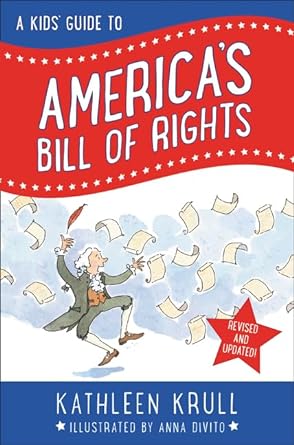
This chapter book reads like a kid-friendly guidebook. Use portions of it as a read-aloud or an engaging textbook substitute for your middle schoolers.
Buy it: A Kids’ Guide to America’s Bill of Rights at Amazon
The Constitution Decoded: A Guide to the Document That Shapes Our Nation by Katie Kennedy
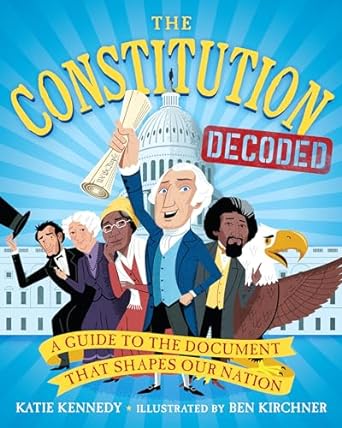
This book is super-useful for teaching middle school kids all about the U.S. Constitution. It has a lengthy section on the Bill of Rights and later amendments.
Buy it: The Constitution Decoded: A Guide to the Document That Shapes Our Nation at Amazon
E-Book: Congress Creates the Bill of Rights
The National Archives also offers an e-book, Congress Creates the Bill of Rights, that’s great for high school students and available for free download.
Get it: Congress Creates the Bill of Rights e-book at National Archives
Videos and Songs About the Bill of Rights for Kids
Pop on these handy videos to introduce or review important concepts about the Bill of Rights for kids.
Bill of Rights for Kids from Learn Bright
This overview will help upper elementary kids get familiar with or review the basics of the Bill of Rights.
A 3-minute guide to the Bill of Rights from TED-Ed
This is our favorite quick and to-the-point recap of the first 10 amendments for students in middle school and above. The animation is extra clever!
We the People: The Bill of Rights featuring Adam Lambert
This edgy song is awesome for summing up the Bill of Rights in a memorable way. The We the People Netflix series features popular musicians and hip animation to explain civics concepts.
The United States Constitution and Bill of Rights by Ryan Hill
This whiteboard sketch video is useful for helping students understand how the Bill of Rights fits into the context of the history of the U.S. government, and how it relates to our lives today.
More Bill of Rights Links and Resources for Teachers
Feel like you need to brush up on your own understanding of the Bill of Rights to better teach your class? We get it! Check out these reliable links to build your own background knowledge. (We even used them to help us create this page!)
National Archives: The Bill of Rights
Read a full transcript of the document, click through explanations of its history and what it means, and even download a high-res image of the Bill of Rights to show students.
Constitution Annotated: Analysis and Interpretation of the U.S. Constitution
If you need clarification on a certain amendment to better talk about it with kids, click straight through to get your questions answered!
The National Constitution Center Amendments resource page
This resource lets you dive deep into each constitutional amendment. They have interpretations of each clause and discussion questions, lesson plans, and videos specific to each individual amendment. Wow!
Get Your Free Bill of Rights for Kids Google Slides
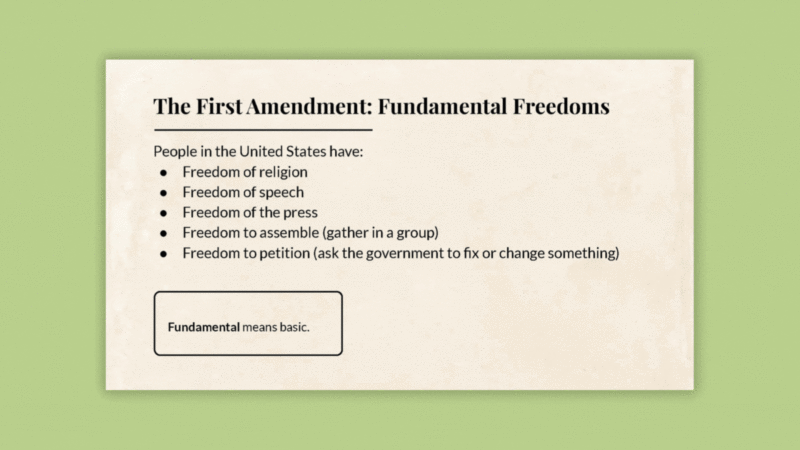
Just click the button below to fill out the form and get instant access to a free downloadable Bill of Rights teaching Google Slides with kid-friendly explanations and discussion questions.
